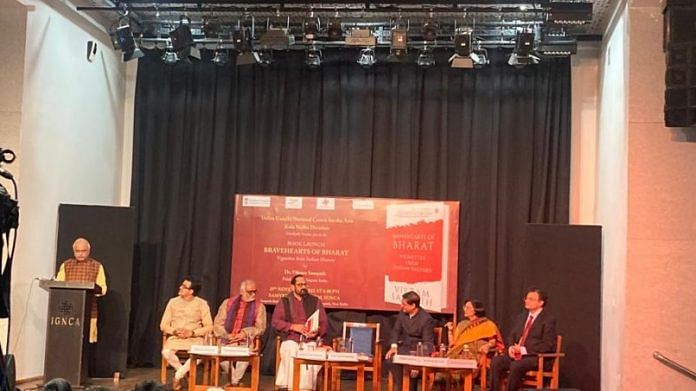
The tide has turned, announced economist and historian Sanjeev Sanyal at the launch of historian Vikram Sampath’s new book, Bravehearts of Bharat: Vignettes from Indian History, on Friday. There’s a new dawn and the Right-wing’s version of history is finally taking centrestage.
Sampath’s new book tells the story of fifteen “long-forgotten, mostly neglected” Indians. The launch was a celebration of people who have added to the civilisational glory of India, as Sampath put it.
“The Left would ask the Right why we only criticise, and why we don’t write. Well guess what, we’re writing now,” said Sanyal, to applause.
Besides Sampath and Sanyal, the panel featured historian Meenakshi Jain, scientist and author Anand Ranganathan, Member of Parliament Vinay Sahasrabuddhe, and Sachchidanand Joshi, member secretary of the book launch venue — Indira Gandhi National Center for the Arts. Rajeev Chandraskher, Minister of State for Skill Development and Entrepreneurship, was chief guest.
“History shapes the mindsets of the younger generation, who are ambassadors of modern India. And to that end, they should know whose backs they are standing on,” Chandrashekhar told ThePrint. He told the audience that his 20-year-old daughter had asked him to get her a signed copy of Sampath’s book — a testament that Sampath’s work resonates with the younger generation as well. The average age of the 200-odd audience stood as another evidence.
Speaking to ThePrint after the event, Ranganathan said it was ironic that Sampath’s book was being launched at the IGNCA. “Well, what do you do? Almost everything in this country is named after a Gandhi,” he said, laughing.
Also read: ‘Indians never invaded’ is a myth. Guptas, Cholas, Lalitaditya Muktapida were conquerors
Honouring lesser known heroes
The panellists all acknowledged the significance of the launch date: the 400th anniversary of Lachit Borphukan, the Assamese military commander and folk hero who led several campaigns against the Mughals. The Narendra Modi government launched a three-day celebration to honour Borphukan, starting November 23, and raise awareness about his contribution to Indian history.
The central theme of the panel discussion, moderated by Ranganathan, was about shifting the dominant historical narrative and ending the focus on “overemphasised” parts of Indian history.
Ranganathan observed that as he travelled to the venue, he passed through Aurangzeb Lane and Babur Road. But not one single road in Delhi is named after any of the fifteen figures in Sampath’s book.
“This is the humiliation we’ve been subjected to,” he said, as the audience nodded in agreement.
Calling it a readable, unputdownable book, Vinay Sahasrabuddhe heralded Bravehearts of Bharat as important for the “de-Macaulayisation” of Indian education.
The President of the Indian Council for Cultural Relations, who also headed a parliamentary panel on the content of school history textbooks, cited the example of how one history textbook had “three-and-a-half paragraphs on Aurangzeb, but only three lines on Shivaji.”
He also offered a criticism, questioning Sampath if it was fair to compare the likes of Chand Bibi of Ahmednagar to Lalitadtiya Muktapida of Kashmir.
Prof. Jain talked about similar histories that Sampath hasn’t included in his book. She argued that there were ‘invaders’ in India who assimilated themselves into Indian culture, unlike others. “When we talk about ‘them’ and ‘others,’ we put the blame on Hindus,” she said. “But we never asked why the other side wasn’t willing to assimilate?”
Sampath spoke last, and talked about why he chose these stories of resistance. One of the figures in his book, Rajaraja Chola, is admittedly a conqueror — but Sampath noted that for Chola, “civilisation outreach was more important for the Indic establishment than political conquest.” And this, the panel agreed, was the difference between invaders who colonised India and Indian invaders who conquered other lands.
Sampath, whose volumes on V.D. Savarkar became bestsellers but courted controversy, rounded up the discussion by saying that the only answer to differing points of view is scholarship — and that there’s no need for childish mudslinging.
Also read: Mohsina Kidwai book launch was all about Shashi Tharoor and Congress coterie
Supply is only now meeting demand
The audience, a mix between college students and older readers, waited patiently as the event started 40 minutes late. It was attended by defence scholar Abhijit Iyer-Mitra and advocate and author J. Sai Deepak.
“It was mesmerising,” said Shashwat Pandey, a second-year law student at Campus Law Center, Delhi University. “I could really connect and identify with what the panel was talking about.”
Another second-year Chemistry student at Miranda House, Anandita Sharma, said that she found the talk exciting and learned a lot, adding that she was new to studying history. Several students were members of Historical India, a group of students across IIT, DU, and ISC that meet and discuss history.
Every single panellist was overwhelmed with requests for selfies and autographs, both before and after the talk — the most popular being Sampath, Sanyal, Ranganathan and Jain.
“It shows you that the supply is finally meeting the demand,” said Sanyal to ThePrint. “There’s clearly an interest in this kind of history. All these people are here out of their free will. Be very clear that there was a demand for history — unfortunately it was suppressed for generations.”
(Edited by Anurag Chaubey)

COMMENTS